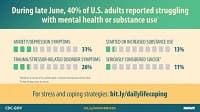
September 15, 2020
Early diagnosis and treatment are critical to reduce the negative long-term outcomes of schizophrenia. Past research has made it easier to identify individuals who are at high risk for developing schizophrenia, but translating this knowledge into treatment requires further complex investigation. Recognizing the importance of this research, and the large scale of investment and collaboration required, the Foundation for the National Institutes of Health has launched an Accelerating Medicines Partnership on Schizophrenia. This five-year program brings together federal, not-for-profit and private organizations dedicated to working together to advance our understanding and develop targeted interventions for high-risk populations. To learn more, see the FNIH website.

August 14, 2020
The COVID-19 pandemic continues to affect us all in different ways, and a new survey highlights its significant impacts on the mental health of U.S. adults. Approximately 41% of participants reported at least one mental health or substance use issue, with higher rates among specific groups. Over 25% of respondents aged 18-24 and 20% of essential workers reported that they had seriously considered suicide in the past month. Recognizing how common these concerns are is a critical step to helping those who are in significant need of treatment and support. To learn more, see the report from the Centers for Disease Control and Prevention.

August 12, 2020
Many people use complementary and alternative practices to support their health and wellbeing, but these practices often have limited supporting evidence. A new study compared three interventions for Generalized Anxiety Disorder — Kundalini yoga, stress management education, and cognitive behavioral therapy (CBT). CBT was overall the most effective treatment and had the strongest long-term effects, but yoga meaningfully improved symptoms for more than half of participants after three months of practice. Although it was not shown to be more effective than CBT, yoga is easily accessible for many people and may be a valuable practice for individuals with anxiety. To learn more, see the study in JAMA Psychiatry.

August 11, 2020
Using a series of statistical analyses known as computational causal discovery, researchers have identified five direct causes of post-traumatic stress in early-career police officers. Participants completed a comprehensive set of clinical, genetic, physical, and self-report assessments during their academy training with follow-up after 12 months of service. Although the 200 officers who experienced post-traumatic stress had diverse experiences during that year, they shared at least one of five specific behavioral or genetic factors. This information may allow the development of targeted interventions to reduce the risk of post-traumatic stress disorder. To learn more, see the study in Translational Psychiatry.

July 15, 2020
For individuals with schizophrenia who struggle to maintain regular treatment, long-acting injectable antipsychotics (LAIs) may be a valuable option. A new study indicates that LAIs may be especially beneficial as an early treatment. Among individuals who had been receiving antipsychotic therapy for fewer than five years, psychiatric hospitalization was less common for those treated with an LAI compared to typical treatment. Reducing the chances of relapse and hospitalization for those with early-phase schizophrenia is an important step to supporting recovery. To learn more, see the study in JAMA Psychiatry.

July 9, 2020
As the COVID-19 pandemic has led to a significant increase in use of teletherapy, it is critical to measure the effectiveness of online and virtual treatment tools. A new analysis shows that cognitive therapy (CBT) for depression may actually be more effective when it is delivered virtually compared to a traditional face-to-face setting. Across 17 studies conducted in six countries, participants reported greater improvement in symptoms and no change in satisfaction when they connected with their therapists through web-based applications, video-conferencing, email and text messaging. To learn more, see the study in EClinicalMedicine.

June 10, 2020
New research suggests that depression may be just as important as smoking or high cholesterol in predicting a person’s risk of heart disease. A global study with more than 145,000 participants shows that cardiovascular disease and heart attacks are up to 20% more common in people with depression. The risk is even higher for men, and for people living in urban areas. This evidence strongly supports the need to integrate physical health and mental health treatment to support overall wellness. To learn more, see the study in JAMA Psychiatry.

June 3, 2020
The COVID-19 pandemic has caused significant grief, disruptions to daily life and economic hardship. To measure how these conditions are affecting mental health, researchers conducted a nationwide survey of U.S. adults and compared the results to a similar survey conducted in 2018. Overall rates of psychological distress more than tripled from 2018 to April 2020, with some groups showing especially dramatic increases: 24% of young adults (18-29) reported experiencing psychological distress, compared to 3.7% in 2018. As the pandemic continues, communities and providers must prepare to support a greater need for mental health treatment. To learn more, see the report from JAMA.

May 22, 2020
Researchers are beginning to understand exactly how chronic stress plays a role in the development of conditions like anxiety and depression. Past studies have connected chronic stress to inflammation in the brain. And now, using a specialized mouse model, researchers have demonstrated that stress only leads to behavior change, like social withdrawal and memory deficits, when receptors for the inflammatory compound Interleukin-1 are active in the hippocampus. If future studies replicate this pathway in humans, it may lead to new, specialized treatment options. To learn more, see the study in Molecular Psychiatry.

May 13, 2020
Lesbian, gay, bisexual, transgender, queer or questioning (LGBTQ) youth are significantly more likely to report depression and suicidality than their straight/cisgender peers. A new report focuses on Asian American and Pacific Islander (API) youth, who are often excluded from studies. The report shows that API youth are significantly less likely to be open about their LGBTQ identity with their parents but are equally as likely as non-API youth to share their identity with friends. Critically, sexual orientation acceptance from straight friends reduced the risk of suicide among API LGBTQ youth by more than half. To learn more, visit the Trevor Project website.
NAMI HelpLine is available M-F, 10 a.m. – 10 p.m. ET. Call 800-950-6264,
text “helpline” to 62640, or chat online. In a crisis, call or text 988 (24/7).